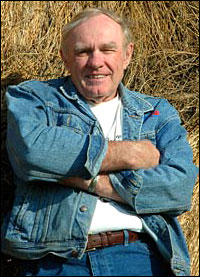Grist asked two gurus from the sustainable farm/food world to weigh in on the role of food in the 2008 election. Before they could get to work on their piece, Michael Pollan landed his opus in The New York Times Magazine. That sent our experts in a new direction — an op-ed as dialogue.

Dan Barber.
Photo: Nicholas Basilion
Dan Barber: Fred, I think we both agree that right now there isn’t enough money being directed to the food crisis. And with the budget even more strained, it’s looking increasingly unlikely that we will see any major investment from a new administration in food programs. Is there more that the farmer, and the consumer, can do to effect change?
Fred Kirschenmann: We now know from experience that when farmers and consumers collaborate to bring about change in the food system they are a powerful force. Farmers markets, community-supported agriculture, organic agriculture, [and] local foods were all driven not by government policy but by consumers and farmers collaborating to change the way food is produced and made available. As it turns out, this means we are increasingly no longer farmers and consumers, but together we are food citizens — people in local communities exercising their civic duty where food is concerned.

Fred Kirschenmann.
Courtesy Leopold Center, Iowa State University
Could we begin to address the challenges surrounding the food crisis by exercising our civic duties within local communities to address some of the inequities and dysfunctional policies? The core issue here is to shift our food policy from subsidizing commodities to supporting communities. That in turn would require a democratic process at the local level. This is already being addressed in many states through state food policy councils. Imagine enriching such state councils with local food policy councils that explored and addressed food crises in every community. Might that be one way to effect real change?
DB: It’s never really surprising to hear you brilliantly articulate both the agricultural challenges and opportunities of our time. You do it often. But you’re downright Obama-like here — thoughtful, concise, and without any anger at the stupidity and short-sightedness of American agriculture policy for the last half century.
I wish I were as patient, but alas (or maybe not) I’m less optimistic at this point about what can happen at the local level, or that it will happen quickly enough, and that it will be significant enough to fix what we all know to be a very broken system. In fact I even wonder about the premise of my own question! Why, for instance, do we take it for granted that a new administration, confronted with the economic crisis, will not see the immediacy of expending some political capital on investing in a new food system? Michael Pollan, in a letter to the next president in last week’s New York Times Magazine, made it clear: “Unless you [reform the entire food system], you will not be able to make significant progress on the health care crisis, energy independence, or climate change. Unlike food, these are issues you did campaign on.”
Whether it’s McCain or Obama in two weeks, whether they’ll have the luxury, or the burden, of working with a Democratically controlled Congress, our next president should declare a Sputnik-like initiative to transform our food policy. He should literally walk into his new office with an armful of executive orders — orders that would go to the heart of our transforming our food economy in the same way that Bush used executive orders to deregulate the financial industry. And he could use the next farm bill as the launching off point for a relocalized food system that will provide healthy, delicious, and sustainable food for our country’s future.
There probably isn’t a political analyst who wouldn’t call that presidential suicide. They’d say, “We’re facing the worst financial crisis since the Great Depression and you want to talk about food?” What would you say back to them, Fred?
FK: Dan, as always you get right to the heart of the practical dimensions of the problem. I agree that reforming the farm bill is a daunting challenge filled with potential for political suicide for anyone who tries. But according to some reports, there are now over 12 percent of the U.S. population going hungry, and globally over 2 billion people live on less than $2 a day. When food costs go up 5 or 10 percent for those populations, it is a crisis. And anyone who thinks we can avoid civic unrest under such circumstances is simply not paying attention. So the next president can take a position: Either we invest in solving the problem or we end up spending the money on trying to contain the mess created by the problem. And while we have now been indoctrinated in a “you are on your own” economic philosophy for several decades, I still believe that the average Joe and Mary in this great country of ours do not want to see their neighbors hungry.
DB: Joe and Mary would probably not mind seeing some fat cats on Wall Street go a little hungry. In fact, I can’t help thinking that the credit meltdown we’ve found ourselves to be in is somehow analogous to the agricultural meltdown we’re going to face soon. That might be instructive for the new president to see before it’s too late.
FK: You mean our practice of farming in a way that continues to exhaust nature is similar to a financial system that allowed people to continue to borrow money they couldn’t afford?
DB: Exactly. Both crises find their origin in the failings of free market fundamentalism. We can’t continue to reap profits from the land if the reserves — water, soil biology, biodiversity — are depleted. At some point the house is going to call, and when Mother Nature calls, she does so with more ferociousness than foreclosure. Just like we need strong oversight on large financial institutions, we need better management and increased support to local economies, small farmers, and local banks.
FK: In fact, we already have a very creative program that is designed to do more of that; it is called the Community Food Security Grant program. On a competitive basis, communities can come up with their own creative solutions to solving [local] food security problems and apply for small amounts of money to help solve them. I have seen some of the proposals from communities in this program and they have been exceptionally creative. Think what we could do if those funds were simply increased eight- or tenfold. We might also fold another critical issue into such legislative innovation — make it possible for the next generation of farmers to get access to land so they can raise more of our food locally. With only a little over 400,000 farmers producing 94 percent of our food and only 5.8 percent of our farmers under age 35 (that was as of the 2002 census data), we have to begin addressing the beginning farmer crisis. Why not address them both as a response to the food crisis?
DB: Right; that seems so obvious. But to make the kinds of changes you’re proposing, we need political leaders who are educated about agriculture. We elect officials schooled in law, history, and business. Few if any give serious account of life’s physical realities, or about the physiology of human beings and other animals, or of plants. It’s no wonder our leaders continue to pass legislation so hopelessly out of touch with the agricultural challenges of the future.
FK: But I think there are political leaders, and even leaders in the food industry, who understand this and want to help bring about the changes. What we need is an informed and active public that supports them. Paul Hawken tells us there is a “blessed unrest” which is ready to act. So we all need to call on our food citizens to rise to the occasion. The time is right.
DB: Farming, like finance, is risky business. How can we help to counterbalance those risks for this next generation of farmers?
FK: I think we need to develop new business models to address this issue. In our Agriculture of the Middle project we have been proposing a new model for doing business in the food industry. In our current supply chain model, everyone in the chain competes with everyone else. Processors want to get the raw materials from the farmer as cheaply as possible, the distributor wants to get the food from the processor as cheaply as possible, and the retailer wants to obtain it from the distributor as cheaply as possible. And of course price, not value, determines the outcome. And everyone is on their own. In our new model, which we call the values-based value chain (instead of supply chain), everyone in the chain cooperates with everyone else in the interest of providing the consumer with a product of superior value — what the customer actually wants. In this model everyone in the chain shares equitably in the risks and rewards. In times of uncertainty and price volatility such shared risks and rewards, based on agreed upon and shared values, prove to be much more resilient than when everyone is on their own.
DB: That’s the kind of model that consumers will respond to, not just because it provides a superior product, but because it gives eaters, and chefs like me, a connection to where their food is coming from. It’s the story that separates the small family farmer and even the big mid-sized family farmer from the big food chain. Because like you said, all along the big food chain — from seed to farmer, to trucker, to distributor, to marketplace — price is the determining factor. But when you have a story from a family farmer about a carrot, and about the soil it’s growing in, and what that farmer’s grandfather grew in that same soil — if you have a quick narrative like that, you have something that’s so unique and so infectious to people who want this kind of food. And it informs their appetite literally. What could be more delicious than that?
FK: Exactly!
Dan Barber interviewed by Grist’s Tom Philpott at Slow Food Nation in September.
Dan Barber is an award-winning chef and co-owner of Blue Hill Restaurant in New York and Blue Hill at Stone Barns in upstate New York, also home of the Stone Barns Center for Food & Agriculture. Fred Kirschenmann is an organic farmer and distinguished fellow at the Leopold Center for Sustainable Agriculture at Iowa State University.


